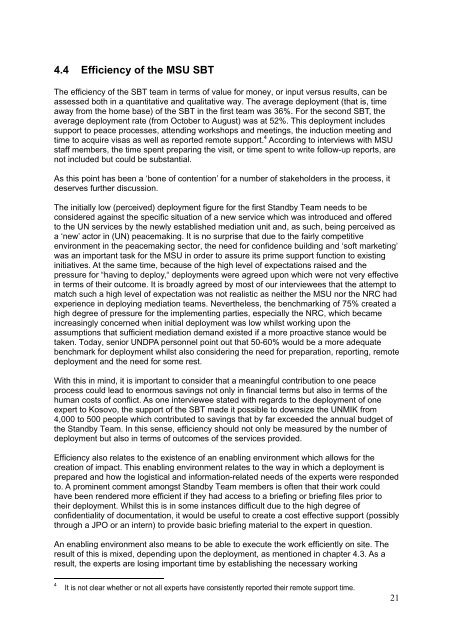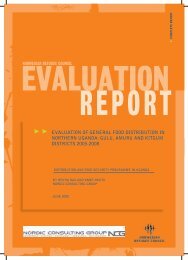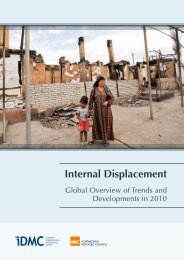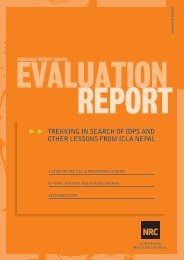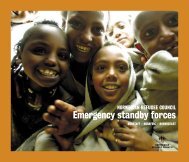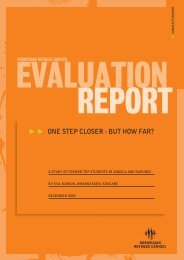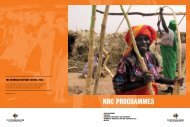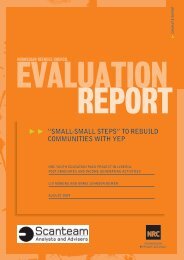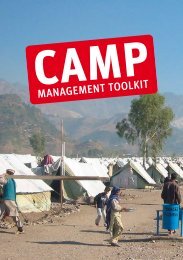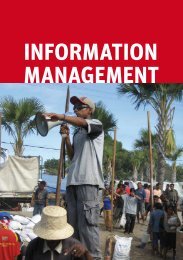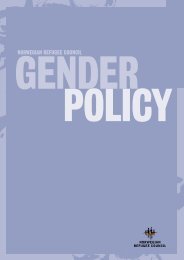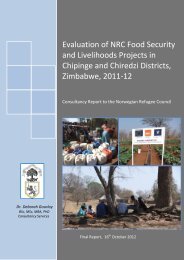Download report here - Norwegian Refugee Council
Download report here - Norwegian Refugee Council
Download report here - Norwegian Refugee Council
- No tags were found...
Create successful ePaper yourself
Turn your PDF publications into a flip-book with our unique Google optimized e-Paper software.
4.4 Efficiency of the MSU SBTThe efficiency of the SBT team in terms of value for money, or input versus results, can beassessed both in a quantitative and qualitative way. The average deployment (that is, timeaway from the home base) of the SBT in the first team was 36%. For the second SBT, theaverage deployment rate (from October to August) was at 52%. This deployment includessupport to peace processes, attending workshops and meetings, the induction meeting andtime to acquire visas as well as <strong>report</strong>ed remote support. 4 According to interviews with MSUstaff members, the time spent preparing the visit, or time spent to write follow-up <strong>report</strong>s, arenot included but could be substantial.As this point has been a bone of contention for a number of stakeholders in the process, itdeserves further discussion.The initially low (perceived) deployment figure for the first Standby Team needs to beconsidered against the specific situation of a new service which was introduced and offeredto the UN services by the newly established mediation unit and, as such, being perceived asa new actor in (UN) peacemaking. It is no surprise that due to the fairly competitiveenvironment in the peacemaking sector, the need for confidence building and soft marketingwas an important task for the MSU in order to assure its prime support function to existinginitiatives. At the same time, because of the high level of expectations raised and thepressure for having to deploy, deployments were agreed upon which were not very effectivein terms of their outcome. It is broadly agreed by most of our interviewees that the attempt tomatch such a high level of expectation was not realistic as neither the MSU nor the NRC hadexperience in deploying mediation teams. Nevertheless, the benchmarking of 75% created ahigh degree of pressure for the implementing parties, especially the NRC, which becameincreasingly concerned when initial deployment was low whilst working upon theassumptions that sufficient mediation demand existed if a more proactive stance would betaken. Today, senior UNDPA personnel point out that 50-60% would be a more adequatebenchmark for deployment whilst also considering the need for preparation, <strong>report</strong>ing, remotedeployment and the need for some rest.With this in mind, it is important to consider that a meaningful contribution to one peaceprocess could lead to enormous savings not only in financial terms but also in terms of thehuman costs of conflict. As one interviewee stated with regards to the deployment of oneexpert to Kosovo, the support of the SBT made it possible to downsize the UNMIK from4,000 to 500 people which contributed to savings that by far exceeded the annual budget ofthe Standby Team. In this sense, efficiency should not only be measured by the number ofdeployment but also in terms of outcomes of the services provided.Efficiency also relates to the existence of an enabling environment which allows for thecreation of impact. This enabling environment relates to the way in which a deployment isprepared and how the logistical and information-related needs of the experts were respondedto. A prominent comment amongst Standby Team members is often that their work couldhave been rendered more efficient if they had access to a briefing or briefing files prior totheir deployment. Whilst this is in some instances difficult due to the high degree ofconfidentiality of documentation, it would be useful to create a cost effective support (possiblythrough a JPO or an intern) to provide basic briefing material to the expert in question.An enabling environment also means to be able to execute the work efficiently on site. T<strong>here</strong>sult of this is mixed, depending upon the deployment, as mentioned in chapter 4.3. As aresult, the experts are losing important time by establishing the necessary working4It is not clear whether or not all experts have consistently <strong>report</strong>ed their remote support time.21


